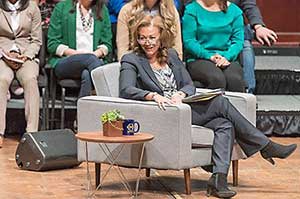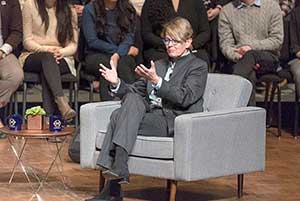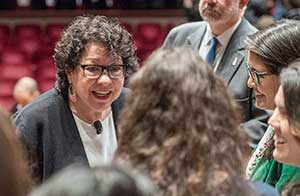Much work to be done

Journalist and author Michele Norris moderated the conversation. (Photo: Roger Hart, Michigan Photography.)
At the first President’s Bicentennial Colloquium, U.S. Justice Sonia Sotomayor and German Justice Susanne Baer, LLM ’93, discussed how respect and compromise can create and strengthen community, stressed the importance of developing diversity in higher education, and urged students to understand the law.
Sotomayor and Baer were the featured guests of the first bicentennial colloquium hosted by President Mark Schlissel, titled “The Future University Community.”
Students, faculty, staff, and community members packed Hill Auditorium Jan. 30 for the discussion, moderated by journalist Michele Norris, former host of NPR’s “All Things Considered.”
Sotomayor became the first Latina justice on the Supreme Court in 2009, and Baer was the first out lesbian and the first scholar known as a radical feminist elected to the Federal Constitutional Court of Germany.
An openness to listen
Speaking first about the role of universities in helping the United States understand and embrace the concept of a larger community instead of splintering off into segments, Sotomayor recalled her own experiences to demonstrate the need for respect in order to bridge difference.
“I realize that my colleagues, every one of them, is passionate as much as I am about the same things I am,” Sotomayor said. “They love this country, we all love the Constitution, and we revere our system of government. We differ on what the right answers might be to promote those institutions, but in our hearts we have the same fundamental love.“You can listen more if you start from a place of respect rather than derision,” she continued. “I think that that is what we need to start from: respect and an openness to listen.”
A willingness to compromise

German Justice Susanne Baer makes a point during the talk. (Photo: Roger Hart, Michigan Photography.)
Touching on how she felt when she first sat on the Federal Constitutional Court of Germany, Baer said community is built on the willingness to compromise.
“It’s about being there, standing your ground, being forceful with arguments,” but being willing to respect the other as a legitimate voice, Baer said.
A global community
Before the justices’ discussion, Sotomayor received an honorary Doctor of Laws degree from U-M. Baer and Norris had received honorary degrees from U-M in 2014 and 2013, respectively.
In his opening remarks, Schlissel invited everyone to consider that the idea of community has undergone great change during U-M’s first two centuries. He said many of those changes were embedded in the U.S. Constitution, such as the addition of amendments that prohibited slavery and expanded voting rights.
“Our community would look very different without these treasured amendments,” Schlissel said. “It would also look different without the broad representation among our faculty, students, and staff of talented, hard-working community members from all around the globe who make Michigan — the university and the state — such a rich and diverse place to work and to live.”
Schlissel said he hopes the future U-M community will be one of greater experimentation, discovery, diversity, and societal impact, where everyone has the opportunity to contribute and to succeed.
Embracing the unknown

Justice Sonia Sotomayor chats with students at Monday’s colloquium. (Photo: Scott C. Soderberg, Michigan Photography.)
Both Baer and Sotomayor spoke about how they had to navigate unknown waters when attending institutions of higher learning.
As a first-generation college student at Princeton University, Sotomayor said she spent her first year in the Ivy League with her “head in the books,” trying to figure out how to be a college student. More importantly, Sotomayor added, she spent time talking to classmates who were completely different from herself. Putting oneself in uncomfortable situations is necessary to grow, she said.
“Each of those conversations were ones where I was trying to understand that environment that was so alien to me,” Sotomayor said. “And I think that discomfort made me more willing to go out and befriend people who were different, and continues in my life today.”
In another example from her career, she said although she has no children, she understood the late Justice Antonin Scalia’s devotion to his large family, similar to her own mother’s love.
“That is what you have here, the opportunity to experience things that are different from what you know,” she continued. “And if you can take full advantage of that, then you will have gotten the best of education.”
When Baer attended the U-M Law School, she said she was afraid of being called on by instructors, and experienced the dual challenge of being an international student in a U.S. institution and not revealing her sexuality to her classmates.
Baer urged students never to run away from life’s challenges. Instead, she said, they should keep moving forward and create their next opportunity.
“Diversity to me was not an abstract concept. It was opening up to the little backpacks everyone carries,” Baer said. “Everyone has their story. Everyone has their feelings of discomfort.”
Equality starts here and it ends here
Tying in to the colloquium’s theme about the future university community, both justices emphasized the importance of granting everyone, regardless of background, access to education.
Answering a question about what a modern, public university would look like decades from now and what it needs to thrive and remain inclusive, innovative, and a leader of society, Sotomayor said it’s going to look a lot like U-M, to a round of applause.
“But — with even greater diversity,” Sotomayor said to a second round of applause from the audience. “I don’t think we can get there without addressing it because it is an ideal to be a color-blind society. Some of you may have read my decisions and know that I don’t think we can get there without talking about it and without facing its issues directly.”
“We are making large improvements toward that kind of equality but we’re still far from it,” Sotomayor continued. “When you look at the number of African-Americans at the University of Michigan, there’s a real problem there. And why is diversity important? For me I think the answer is quite simple: It’s because until you reach that equality in education, we can’t reach equality in the larger society. It starts here and it ends here.”Referencing U-M’s top-ranked programs, Sotomayor said the University has a handle on what makes the quality of curricula important, but it still needs to figure out how to engage everyone in receiving that quality of education.
In the past year-and-a-half, the University has rolled out several new initiatives to tackle the problem Sotomayor addressed. In fall 2015, President Mark Schlissel announced the Wolverine Pathways program to help create a pipeline to U-M for students in the Ypsilanti and Southfield school districts. That was followed a year later with the HAIL Scholarship initiative, which also created opportunities for low-income students from Michigan. And in October 2016, the University rolled out a five-year, $85-million strategic plan for diversity, equity, and inclusion.
Meanwhile, Baer said the “wider the doors” are for places like universities, the better the places will be. She said she thinks the access points are still “depressingly” shaped by class.
It’s critical that these places and communities stay open to everyone from around the world, she added.
Paying attention
Toward the end of their discussion, before answering students’ questions, both justices stressed the importance of being active citizens and understanding the law.
Sotomayor urged guests to pay attention to what’s not written — like the right to an education — when reading the Constitution.“Laws regulate your very existence and virtually every relationship you have and if something’s that important, you should at least understand its basic operation in the community you live in,” Sotomayor said. “I do ask you to be informed citizens. You can’t really improve the world you’re in unless you understand how it functions.”
Baer told guests the law was theirs; she recommended adding the Universal Declaration of Human Rights and subsequent conventions, such as the international conventions on the eliminations of racial discrimination and discrimination against women, to their reading lists.
These documents are not only for lawyers, she said. They can be used to activate and mobilize people around American principles and concepts. They serve as “the common ground we all agree to live up to — those ideals and promises to be fulfilled.”
This story originally appeared in The University Record, the official source for faculty-staff news at the University of Michigan.




Joseph M. Scandura, Emeritus Professor, University of Pennsylvania - UM BA, 1953, MS 1955
IF IT’S NOT IN THE CONSTITUTION, IT IS NOT IN THE CONSTITUTION. OTHERWISE, ANYONE COULD ADD AND JUSTIFY WHATEVER THEY WANT.
Reply
Adam Rubinstein - 1985
“Sotomayor urged guests to pay attention to what’s not written — like the right to an education — when reading the Constitution.”
Therein lies the problem with Constitutional relativists and judicial activists like Sotomayor. The Constitution was crafted with purposeful intent and provisions to effect change albeit through the states and the populace rather than by non-elected, elitists like herself. The use of the judiciary to effect social policy is destructive, divisive, and is ruinous to our society.
Reply
David S - LSA 1980
Thank you Adam We are in an odd time. Up is down, diversity is not diverse, the tolerant are the intolerant and in place of educating students, they are led to believe good leaders are bad and bad leaders good. And the winner the is the loser.
Reply
Gerard Freeman - 1950 Rackham
As an obvious activist j Supreme Court judge Sotomayor who would like to legislate rather than adjudicate she is hardly one that should have been chosen for this very important position. And, sadly, it’s for life.
Reply
Edwin Benson - 1978
It strikes me that every time there is a university discussion about diversity, the participants are anything but diverse. Having two powerful, left-wing women get together to pat themselves on the back for their own achievements accomplishes nothing except to make those who agree with them feel good. It is time for the universities – our own University of Michigan among them – to sponsor real intellectual diversity by including other points of view.
Reply
Gary Sickels - MA 71 PhD Candidate 82
According to some of the replies criticizing Justice Sotomayor’s tendency to be a legislative judge at the expense of states’ rights I would remind them of states purposefully limiting the rights of targeted populations. Southern states, in particular, do not have an exemplary record in supporting civil rights in the past nor in passing legislation designed to hinder not assist voting rights. Also “Citizens United” as well as so called “right to work” laws were cleverly advertised and designed to place political power in the hands of the privileged few, not the working class.
Reply
John Cruz - JD 79
None of the comments mentioned states’ rights in connection with Justice Sotomayor’s willingness and propensity to legislate from the bench. As for the recognition of unenumerated constitutional rights which she advocates exist but are naked to the eye, when will Justice Sotomayor’s Constitution no longer bear much resemblance to what is on the written page?
Reply